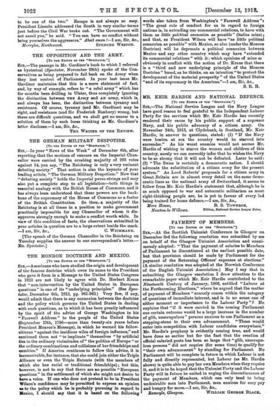PAYMENT OF MEMBERS.
[To THE EDITOR OF THE "SPECTATOR."] SIR,--At the Scottish Unionist Conference in Glasgow on December 3rd the following resolution was submitted by me _on behalf of the Glasgow Unionist Association and unani- mously adopted: "That the payment of salaries to Members of Parliament be discontinued at the earliest possible date, but that provision should be made by Parliament for the payment of the Returning Officers' expenses at elections." (A similar resolution was adopted at the Norwich Conference of the English Unionist Association.) May I say that in submitting the Glasgow resolution I drew attention to the remarkable paper which Mr. Keir Hardie contributed to the Nineteenth Century of January, 1906, entitled "Labour at the Forthcoming Elections," where be argued that the matter of payment of Members " scarcely comes within the category of questions of immediate interest, and is in no sense one of either moment or importance to the Labour Party " ? He explains that "if it were carried in the coming Parliament one certain outcome would be a large increase in the number of glib, unscrupulous " persons anxious to use Parliament as a stepping-stone to their own advancement. " These would enter into competition with Labour candidates everywhere." Mr. Hardie's prophecy is evidently coming true, and would have done so earlier but for the fact that the creation of official salaried posts has been so large that "glib, unscrupu- lous persons " did not require (for some time) to qualify for "their own advancement" by standing for Parliament. No Parliament will be complete in future in which Labour is not fully and directly represented, but Labour (as Mr. Hardie shows) is quite able to pay her own Members when they require it, and it is to be hoped that the Unionist Party and the Labour Party will in future be united in urging the discontinuance of the payment of Members, which can only tend to bring undesirable men into Parliament, men anxious for easy pay and hungry for more.—I am, Sir, &c.,


























































 Previous page
Previous page